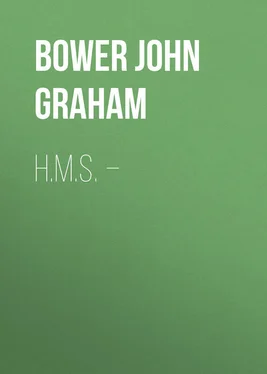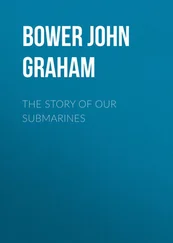John Bower - H.M.S. –
Здесь есть возможность читать онлайн «John Bower - H.M.S. –» — ознакомительный отрывок электронной книги совершенно бесплатно, а после прочтения отрывка купить полную версию. В некоторых случаях можно слушать аудио, скачать через торрент в формате fb2 и присутствует краткое содержание. Жанр: foreign_antique, foreign_prose, foreign_language, на английском языке. Описание произведения, (предисловие) а так же отзывы посетителей доступны на портале библиотеки ЛибКат.
- Название:H.M.S. –
- Автор:
- Жанр:
- Год:неизвестен
- ISBN:нет данных
- Рейтинг книги:3 / 5. Голосов: 1
-
Избранное:Добавить в избранное
- Отзывы:
-
Ваша оценка:
- 60
- 1
- 2
- 3
- 4
- 5
H.M.S. –: краткое содержание, описание и аннотация
Предлагаем к чтению аннотацию, описание, краткое содержание или предисловие (зависит от того, что написал сам автор книги «H.M.S. –»). Если вы не нашли необходимую информацию о книге — напишите в комментариях, мы постараемся отыскать её.
H.M.S. – — читать онлайн ознакомительный отрывок
Ниже представлен текст книги, разбитый по страницам. Система сохранения места последней прочитанной страницы, позволяет с удобством читать онлайн бесплатно книгу «H.M.S. –», без необходимости каждый раз заново искать на чём Вы остановились. Поставьте закладку, и сможете в любой момент перейти на страницу, на которой закончили чтение.
Интервал:
Закладка:
Klaxon
H.M.S. –
When Homer launched his epic on the literary sea,
The critics were as merciful as they can ever be:
"We take it that the author did the best that he can do,"
"And the book should be remembered for at least a year or two…"
But Homer let the critics go, and listened with a smile,
For he had heard a verdict that was better by a mile,
In a code that only Homer as a husband understood, —
"You are a funny clever thing – I'd no idea you could."
"1923."
[The following is the description by Professor J. Scott, F.R.S., of his recent Airship Journey across the old Bed of the North Sea. July 1, 1923.]
It is perhaps unnecessary for me to state the objects and purpose of my journey of last week, as it would be false modesty in me not to recognise the great interest taken by the geologic and antiquarian worlds in my proposed enterprise. For the benefit, however, of those for whose intelligence the so-called "Popular" geologic works are compiled, I will recapitulate some points which are ancient history to my instructed readers.
The winter of 1922 witnessed the greatest geologic change in the earth's surface since the last of the Glacial epochs. Into the causes and general results of this change I do not propose to enter, beyond mentioning my opinion that the theory propounded by Professor Middleton (a theory designed only for one purpose – that of attempting to throw doubt on the data and reasoning of my first monograph on the subject) is not only childish, but based on a fallacy.
I will confine myself to the results as they affected this country and the continent of Europe, of which it is now a prolongation or headland – not, as the Daily Press erroneously labels it, a peninsula.
The total change in elevation of the land is now calculated at 490 feet 7 inches, but more accurate measurements are still being taken. This great change brings us back to a geologic age when man and mammoth co-existed in the primeval forest of Cromer, and when the Dogger Bank was a great plain where wild beasts roamed and palæolithic man left the traces of his industry in the bones and shaped flints which we hope soon to collect in quantities from the mud and ooze with which thousands of years of sea-action has covered them.
I had little difficulty in obtaining Admiralty permission to accompany the Captain of a Naval Airship on one of his regular patrol trips across the great expanse of mud which was once the North Sea.
Of course in the six months since the departure of the Ocean from the new lands, the district has been regularly patrolled by the Navy, but the air is as yet the only safe route by which to cross it. It will be some time, perhaps years, before the surface becomes safe to walk on, although the Government is plentifully sprinkling grass and other seeds from all passing aircraft. In the large and powerful airship in which I was privileged to travel, we had every modern device for enabling a close inspection of the surface to be taken. A trail-rope was used when it was desired to drift slowly or to actually hover over some of the points of interest which we observed on our passage.
The day was fine and clear, and I could not have wished for better weather conditions when we rose over Dover and started the main engines on a north-easterly course. As no maps can yet be compiled of the New Lands (as popular clamour has most inaccurately labelled them) owing to their dangerous surface, we navigated by the old Admiralty charts, marked in depths of water, and I was amused at having the Varne and Goodwin "shoals" pointed out to me – the objects indicated being long ridges of sandy hills rising from the shining surface of the Channel bed. Off Deal and Dover a few of the wrecks are being worked on by enterprising local Salvage Companies – a road being laid out to each composed of gravel, sand, and brushwood. I fear, however, that the speculators will not profit greatly. The roads are good enough over the sand, but where they cross the mud-flats they swallow not only their traffic but the funds of their owners.
As we travelled up the valley with the drone of our engines echoing from the whale-backed ridges on either side, with our gondolas barely a hundred feet from the ground, I discussed our programme with the Captain, whose views and reminiscences I found most entertaining. On general subjects he was like most of his service, almost contemptibly uneducated (I might mention that he did not understand what Magdalenian culture was!), but he was evidently well read in his own trade. He told me several stories which were no doubt excellent, but which were marred to a point of incomprehensibility by a foolish interlarding of technical terms. I gave him a short précis of what is known or deduced of prehistoric life on the New Lands, and spoke of the bones and fossils occasionally found in trawl-nets by the fishermen. His point of view was that the war overshadowed everything. He seemed to think that that event was one from which all others should date, although it had lasted such a short time. As very little of interest to me could yet be seen owing to the general coating of slime with which the land was covered, I amused myself by listening to his experiences on his weekly air patrols, his conversation being somewhat after this style: —
"Yes, it was a fair snorter while it lasted – that gale, – damn lucky we hadn't many ships out. Yes, most of 'em got in. They either ran down Channel (Lord! the Straits were like opening the caisson gates to a graving-dock!) and made New Queenstown, or else they got into harbour on the East Coast and stranded there. You see, what with mines and wrecks, the North Sea wasn't being used much, and as the navies were taking a rest there wasn't much of value at sea. Some ships got stuck though – fishing boats mostly. No, they were all right – it took a week to drain off, and it was calm weather when they grounded. Most of them have wireless now, and they yelped for help, and we took 'em off. Those that hadn't were a bit hungry when we found them, but I don't think we lost many. You see, all nations sent air fleets out. Have you read the U.S. Magazine? You ought to; there's a damn good argument going on as to whether it would have paid us or Germany most if it had happened during the war. I think us, myself. You see, there's only a narrow channel now running past the Norwegian coast, and we could have mined that. Look at that, Professor! How's that for mines? That's Zeebrugge with the houses showing over the sand-hills. Whose? Oh! both sides put 'em there – that hollow to the east is proper stiff with them, isn't it? Port fifteen – Quartermaster! steer east – What? No, just going to show you something. You said it seemed a wicked waste of material; well, look over there – two of them got it. One's a U.C. boat but the other's a big one. They picked them up coming back, and that big chap's nearly in two halves – Starboard twenty, Quartermaster! No, we needn't go closer, you'll see one every half mile between here and Heligoland – some of ours as well as theirs. Yes – that's a Dutchman – torpedoed by the look of him. See the hole in the stern? Oh, butter and bacon and that sort of thing! No, nobody in her. Why? Well, look at the davits – they left her before she sank – all the boats are gone.
"Like these glasses? That's the Hinder over there. Yes, they still live in her, and she's still useful. A fine big lightship, isn't she? She settled down at her moorings as peacefully as could be, and when we sent a line down to them on our first patrol trip after the show, they sent up a note asking for some 'baccy, and would we post some letters for them? Nothing ever did worry the Hinder in the war, and it won't now. You see, English and German used to fight under her tail every other night, and as she was an international light she just flashed away and looked on. I wonder none of their crew have written a book yet – 'Battles round the Hinder ,' by an Eyewitness. It would be better than most of the truck that has been written in England about it. Yes, she lies in a bit of a hollow, but the light shows up all right, and that's all we want. Here you are; this is what you wanted."
Читать дальшеИнтервал:
Закладка:
Похожие книги на «H.M.S. –»
Представляем Вашему вниманию похожие книги на «H.M.S. –» списком для выбора. Мы отобрали схожую по названию и смыслу литературу в надежде предоставить читателям больше вариантов отыскать новые, интересные, ещё непрочитанные произведения.
Обсуждение, отзывы о книге «H.M.S. –» и просто собственные мнения читателей. Оставьте ваши комментарии, напишите, что Вы думаете о произведении, его смысле или главных героях. Укажите что конкретно понравилось, а что нет, и почему Вы так считаете.











